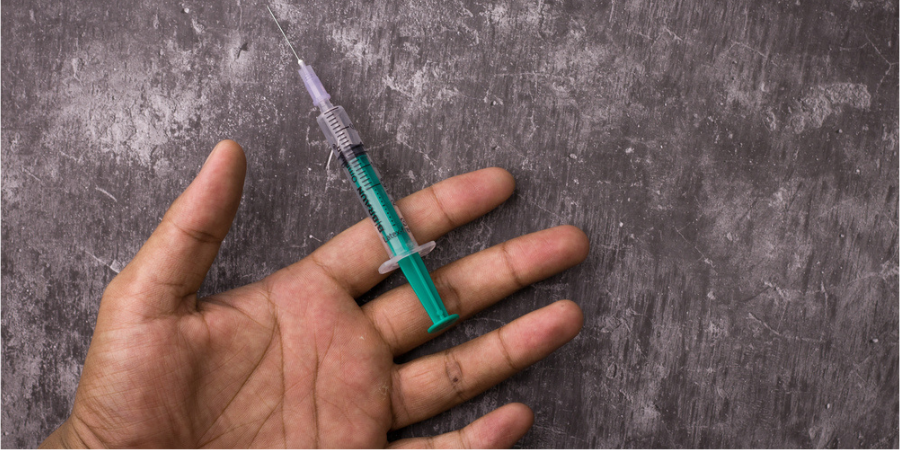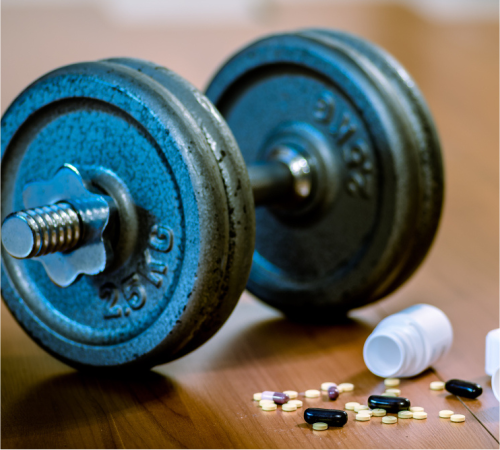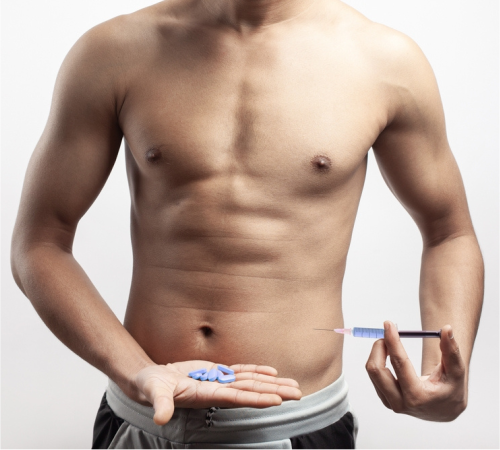
Written by:

Medically Reviewed by:
Last Updated:
January 6th, 2025
Steroid Addiction | Signs, Symptoms & Effects
With social media showcasing idealised bodies, sports demanding ever-higher performance levels and mental health issues causing low self-esteem and insecurities, steroids can seem like a tempting shortcut. However, the costs can be life-destroying, with steroid addiction, potentially causing severe health problems, burning through your money and pushing your friends and family away. Steroid addiction can creep up on you, taking hold before you realise it and without professional help, can spiral out of control and cause lasting harm.

What are steroids?
Steroids are a type of drug that can affect how your body works. There are two main types of steroids:
Anabolic steroids
These are synthetic versions of testosterone, a hormone that helps build muscle. People use anabolic steroids to increase muscle size and strength or to improve athletic performance. When we talk about steroid abuse and addiction, it usually refers to anabolic steroids.
Corticosteroids
These steroids are used to reduce inflammation and are prescribed by doctors to treat medical conditions like asthma, arthritis and allergies. They help reduce swelling and inflammation but are not used for building muscle.
How are anabolic steroids abused?
Some people take much higher doses of steroids than a doctor would ever prescribe, thinking it will make them stronger or build muscle faster.
1. Taking too much
Some people take much higher doses of steroids than a doctor would ever prescribe, thinking it will make them stronger or build muscle faster.
2. Cycling
This means taking steroids for a few weeks or months, then stopping for a while and starting again. This is repeated over and over in a prolonged “cycle”.
3. Stacking
Stacking is when people take two or more different types of anabolic steroids at the same time, believing that this will give them better results.
4. Pyramiding
This is when users start with a small dose and gradually increase it until they reach a peak before slowly reducing it. Pyramiding is supposed to help their bodies slowly get used to using anabolic steroids.
What is steroid addiction?
Being addicted to steroids means you keep taking steroids compulsively even though they are causing big problems in your life. As with other types of drug addiction, an addiction to steroids develops step-by-step and usually looks something like this:
1. Initial steroid use
You start taking steroids to build muscle, improve your athletic performance or feel better about how you look.
2. Continued steroid use
You like the results so you keep taking steroids regularly, often in larger doses or more frequently than when you started.
3. Tolerance
Over time, your body gets used to steroids, so you need more of them to build the same amount of muscle or improve your performance. This is called tolerance, and it is a major stepping stone to steroid addiction.
4. Steroid dependence
Your body then starts to rely on the steroids to function normally because they have been present in your systems for so long. If you then try to stop taking them, you might feel weak, tired, depressed or experience other steroid withdrawal symptoms.
5. Steroid addiction
At this stage, steroids take complete control of your life. You spend a lot of time and money getting and using steroids and cannot stop taking them despite the obvious harm they are doing.
In the UK, the number of people abusing anabolic steroids has surged over the past decade. Many experts believe that there are now as many as 500,000 people using anabolic steroids, with many likely to be addicted.
Am I addicted to steroids?
Recognising steroid addiction can be tough, particularly if you are pleased with the results so don’t want to accept that you are being harmed. However, here are some signs that can help you know if you’ve crossed the line into addiction:
- You are finding it really hard or impossible to stop using steroids even if you want to quit.
- You often take more steroids than you meant to or use them for longer than you planned.
- You have developed a tolerance, so you are taking more steroids now than when you started.
- You are still using steroids even though you know they are causing health issues, arguments with family or friends or other problems in your life.
- You have come to rely on steroids to deal with stress, boost your confidence or improve your mood.
- You have become super focused on how your body looks and how you perform and feel like you need steroids to achieve these goals.
The effects of steroid addiction and abuse
Steroids may seem like a quick fix to achieving your goals, but they often come with serious health and personal risks. Here’s a closer look at how steroids can impact your life:
Heart problems
Using steroids can cause serious heart problems. They can increase your chance of having a heart attack, raise your blood pressure and make you more likely to have a stroke.
Liver and kidney damage
Steroids can harm your kidneys and liver enormously and in the most serious cases can even cause liver tumours.
Hormonal imbalances
In men, steroids can cause shrunken testicles, reduced sperm count, infertility and breast development. In women, they can lead to a deeper voice, increased body hair and irregular menstrual cycles.
Mental health issues
Steroids can cause extreme changes in mood, such as anger and aggression (often known as “roid rage”) and feelings of depression and anxiety.
Bone and growth problems
Long-term steroid use can lead to weak bones or osteoporosis and, in young people, can stunt growth.
Personal effects
Steroid addiction can cause major relationship problems, poor school or job performance and big financial and legal problems. If you are a professional athlete, the use of steroids can potentially see you receive a lifetime ban for breaking the rules of your sport.
What makes steroids addictive?
Not everyone who uses steroids develops a steroid addiction, but here are some factors which can increase the chances:
Personality traits
People who are more competitive or have a strong desire to excel might be more likely to use and then keep using steroids to improve their performance.
Body image issues
Those who feel insecure about their body or have low self-esteem might use steroids to try to look better and feel more confident and become reliant on steroids.
Mental health
People with mental health issues, like depression or anxiety, might use steroids to feel better, which can quickly lead to steroid addiction.
Peer pressure
Being around friends, teammates or trainers who use steroids or feeling like you have to take them to win can greatly increase the chances of steroid abuse and eventual addiction.
Social media and media influence
Seeing “perfect” celebrities and influencer bodies can make people feel like they need to use steroids to achieve those usually impossible standards.
How is steroid addiction treated?
Steroid addiction is treated in three main steps: drug detox, rehab and aftercare. Detox is the first step where you stop using steroids under a doctor’s care to help manage the resulting withdrawal symptoms. Drug rehab then offers therapy and other types of support to understand why you use steroids and to build the foundations of a new life without them. Aftercare provides ongoing help to keep you from starting steroids again and to build upon those foundations.
Get help for steroid addiction
If you or someone you know is struggling with steroid addiction, don’t wait to seek help. Linwood House offers professional support and treatment to guide you through recovery. Take the first step towards a healthier, steroid-free life by contacting Linwood House today.
Frequently asked questions
(Click here to see works cited)
- The Face. “Steroids are on the rise in the UK, but nobody’s talking about it.” The Face, 26 January 2023, https://theface.com/life/steroids-are-on-the-rise-in-the-uk-body-image-men-drugs-uk. Accessed 5 June 2024.
- Hansard. “Performance-enhancing Drugs and Body Image – Hansard.” Hansard, 21 February 2023, https://hansard.parliament.uk/commons/2023-02-21/debates/0598DC37-2C1C-4386-AF23-70C88C478DA7/Performance-EnhancingDrugsAndBodyImage. Accessed 5 June 2024.
- NHS. “Anabolic steroid misuse.” NHS, https://www.nhs.uk/conditions/anabolic-steroid-misuse/. Accessed 5 June 2024.
Hope, V. D. et al. (2022) ‘Anabolic androgenic steroid use population size estimation: a first stage study utilising a Delphi exercise’, Drugs: Education, Prevention and Policy, 30(5), pp. 461–473. doi: 10.1080/09687637.2022.2070058. - Mullen, Carrie et al. “Anabolic androgenic steroid abuse in the United Kingdom: An update.” British journal of pharmacology vol. 177,10 (2020): 2180-2198. doi:10.1111/bph.14995



